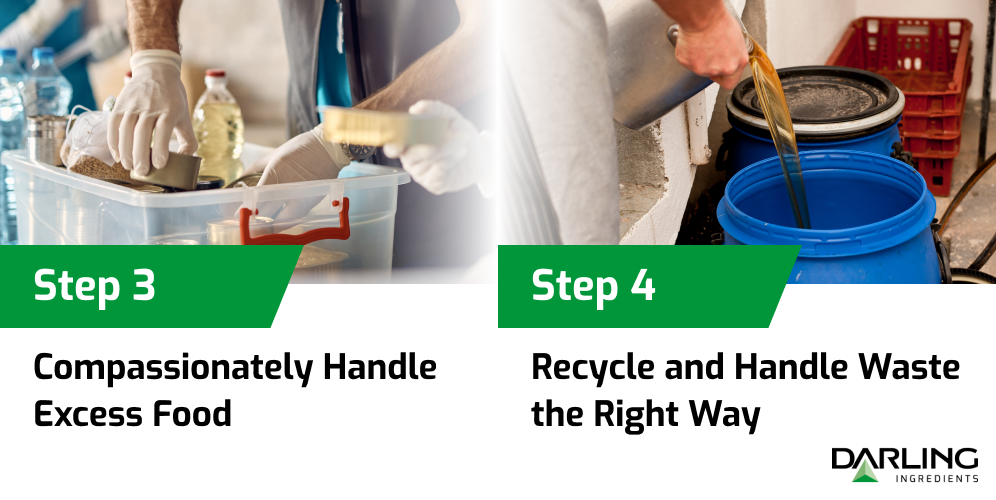1. Minimize the Amount of Packaging Waste
Non-Recyclable packaging and kitchen utensils are one of the food industry’s most significant sources of waste. Replace these single-use plastics with reusable and recyclable ones. Restaurants that eliminate the use of unnecessary plastic packaging and single-use plastics also reduce waste all over the world.
Eco-friendly regulations and ordinances continue to develop. With the likelihood of regulation implementation in your city, less reliance on unrecyclable materials has the potential to avoid the necessity for rapid change.
Even grocery stores continue cutting down on pre-packaged goods, produce bags, and plastic grocery bags. By making these changes, you will be playing your role in helping the environment. You’ll also be one step ahead of the competition when environmental regulations are implemented and enforced.
2. Utilize Eco-Friendly Cleaning Products
Chemicals fill many cleaning products, which are frequently harmful to the environment and people. The sustainability movement has driven the creation of chemical-free alternatives, making them more readily available for purchase. More businesses and restaurants have switched to cleaner options with fewer chemicals.

3. Compassionately Handle Excess Food
You will have excess food regardless of if you work in a processing facility, a food court, or a restaurant. Naturally, it’s a daily by-product. You can help prevent it from becoming waste by having a place to send excess food where it will have a purpose.
Having a predetermined place to send waste food will give it renewed purpose. Food banks and donation apps are making it easier than ever. Some food banks will even pick up food free of charge directly from the kitchen. With apps that connect the two entities, the process is smoother and more efficient.
Reputable restaurants are already taking advantage of this, and so can you. It’s a win-win-win for the restaurant, the food bank, and those who need it. Plus, it helps the earth we inhabit.
4. Recycle and Handle Waste the Right Way
Like excess food, commercial kitchens throw out a lot of cooking oil. You can ease the burden of disposal and prevent your used cooking oil from ending up in a landfill by partnering with a reputable collection service.
Some oil collection services give used cooking oil another life by repurposing it into renewable diesel, a cleaner burning alternative to petroleum fuel that reduces carbon emissions by up to 85% per gallon.
Restaurants that utilize used oil collection services can also use it to their advantage. By marketing itself as a business doing its part in working toward a greener future, a restaurant’s reputation can grow.

5. Implement Energy-Saving Appliances
Commercial kitchens require lots of daily energy to be operational. There is no getting around that, but there are ways to lessen energy consumption. Energy-saving appliances are a great way to be more eco-friendly and save money on utility payments.
To be more energy efficient, only have equipment powered and running when actively in use. Some restaurants have been conserving energy by using LED and motion sensor lighting in the places it is appropriate.
6. Enforce Inventory Efficiency
You can significantly reduce your food waste by being efficient with your inventory. With the help of technological advancements, like Just-in-Time, food retailers and restaurants manage ingredient shelf life and reduce waste due to expiration.
Restaurants and businesses better manage and use their inventory with another technological advancement, shelf-life extenders. Shelf-life extenders are ingredients added to food products after processing to reduce microbial growth. These advancements have reduced the number of wasted ingredients.
The food service industry has positively focused on better inventory management. Retailers do their best to lessen the likelihood of ingredients and supplies that would become waste without use.

7. Build Local Partnerships
Food retailers are making a more conscious and consistent effort to order from local farmers and food producers. Building local partnerships equates to a healthier environment and better-tasting food, but it also boosts the local economy and producers.
Stocking your kitchen with in-season, locally-grown ingredients helps reduce food waste and inspires a seasonal menu. Buying locally also shortens transportation time, which helps lower carbon emissions. Because products don’t have to travel long distances, they will require fewer, if any, preservatives.
Businesses have to adapt to the desires of their consumers. As the world continues to recognize the importance of environmental friendliness, the willingness to buy from retailers that utilize eco-friendly practices and products will persist.
How Can My Restaurant Take the Next Step Towards Sustainability?
Darling Ingredients Canada helps industries across the country become more environmentally friendly through our comprehensive used cooking oil recycling program.
Reach out to a Darling Canada representative today to learn how your business can benefit from our program.
Contact Sales
For customer service inquiries call our toll free number (800) 263-0302
By submitting this form I agree to the privacy policy including the usage of contact details to contact me for marketing purposes.
